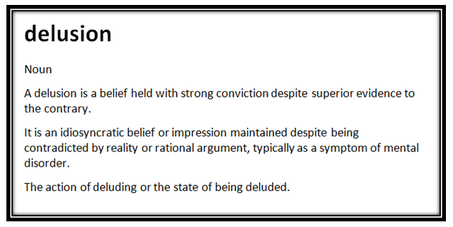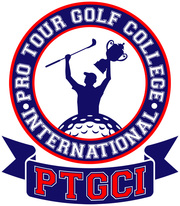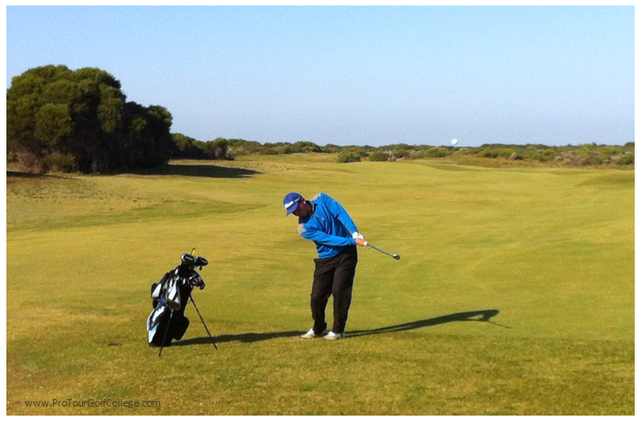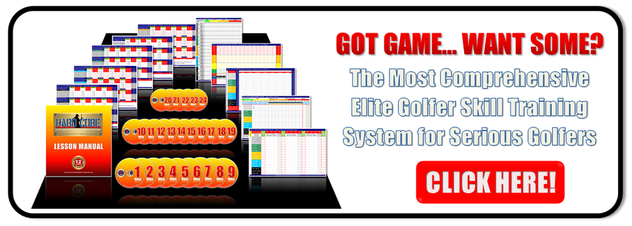The Mental Handicap That Could Stop You From Becoming a Successful Professional Tour Golfer25/4/2015
"To only post your good golf scores in amateur competition is a form of delusional behavior, and it says a lot about the way you think about the game of golf, and your lack of confidence in your playing and competing ability." I think you'll agree that it makes no sense for an average golfer with a playing standard equivalent to an 18 handicap to compete against a single figure handicap golfer “off the stick” as the single figure golfer will win one hundred percent of the time. However when the average golfer uses a golf handicap to play against the single figure golfer, then he has a very good chance to win the match. And that's why a golf handicap is a very helpful system for an average golfer to enjoy their golf and compete with far better golfers on a level playing field in club tournaments. The golf handicapping system allows all amateur golfers to compete with superior skilled golfers, and it was invented primarily for amateur golfers to even up the playing field so they can enjoy their game a whole lot more. And that's a good thing. And for the most part the handicapping system works really well. At least it does for higher handicapped golfers, but probably not so much for highly skilled elite amateur golfers who want to play on tour one day.  Is Your Golf Handicap Your Handicap? The golf handicap for an elite level amateur golfer can actually become more of a mental handicap especially if they are thinking about becoming a professional tour golfer in the not-to-distant future. Why you ask? Mainly because with a handicap the tendency can to be focused more on lowering the handicap rather than lowering the score average in tournaments. You see a golf handicap by its very nature continually adjusts the standard of the golf course to accommodate differences in tee positions, weather conditions and the handicaps of all the golfers competing at the club on the day. And most of those golfers are a long way from being elite golfers, so the handicapping system is geared to their playing standard--not the low handicap golfers. And that's OK because the serious elite amateur knows that professional tour golfers don’t have handicaps - they play golf against the par of the golf course everyday, and in all kinds of conditions from rain to strong winds, and in very cold to very hot conditions. So for the elite golfer, the sooner you can remove the golf handicap mentality from your game and build your skills around competing successfully against the par of every golf course you play, the more prepared you will be when you make the transition from amateur golfer to professional tour golfer. The par of the golf course you play is always the standard, it's not your golf handicap that is the standard. At Pro Tour Golf College we ask our students a simple sentence made up of just 5 simple words... WHAT SCORE DID YOU HAVE?  Do You Make Excuses or Make Scores? You would be surprised what the answers to this question tend to be is most of the time. The answers usually begin with an excuse as to why they didn't play as good as they hoped to. After lengthy training in our program at Pro Tour Golf College they will simply answer either with their score or their score code. "I had 76" or "I had 10 / 2 / 6" In our time we have worked with many amateur golfers who claimed to possess very low handicaps, but upon closer investigation and an analysis of their game we concluded that their actual score average in tournaments was much higher than their handicap portrayed. It turns out that many of them only put their best scores in at tournaments, and when they are not playing to their level of expectation they often walk off the golf course feigning an injury, or simply getting so frustrated and mad that they tear their card up and give up on the day. In professional tour golf, every golf score counts all of the time! Our suggestion is that if you’re seriously considering a career as a professional tour golfer that you accept every score you have. This means that if you shoot an 80 or worse, you add it to your collection of golf scores. Accept your bad scores like you accept your good scores. Any amateur golfer can look good if the only scores they post are their best golf scores, but in the long run this will be detrimental to your career. Of course it hurts to shoot high scores, but it is just as much the reality of golf as shooting low scores is. The bottom line is that you must learn to get over it quickly and keep working on ways to lower your higher scores in tournaments. To only post your good golf scores in amateur competition is a form of delusional behavior, and it says a lot about the way you think about the game of golf, and your lack of confidence in your playing and competing ability when things are not going as planned.  The Upside and The Downside The upside for a delusional elite golfer is that because they submit only their best competition cards, their low handicap makes them eligible to enter a tour qualifying school. Sadly the downside is that over the course of the tournament their high scores each round will expose their true playing ability to everyone. Reality will set in quickly. At every tour school at least 70 percent of the amateur golfers competing are donating their entry fee's to the tour simply because their actual playing and competing skills are nowhere near the standard required. We advise every student at Pro Tour Golf College that has their heart and mind set on playing on a professional golf tour enter a tour school only when their competitive score average in tournaments is at a minimum 25 under par for their past 100 tournament rounds for men, and at least 10 under par for 100 rounds for women. If you are a serious amateur golfer who genuinely wants to become a professional tour golfer then do yourself a favor and seek out the help of a golf instructor who has lot's of experience and success working with professional tour golfers. This highly skilled golf instructor will devise helpful ways for improving your competitive score average getting you prepared properly for a crack at tour school. Also he/she should advise you that the reality might be that you will have to go back to tour school a number of times before you play good enough over the tournament to secure playing privileges on a professional golf tour.  Perth and Jakarta Perth and Jakarta If you are an elite amateur golfer who wants to become a professional tour golfer then your golf handicap should never be used as your guide for entering tour school. The only way to know you are truly ready to make the change from amateur to professional is to develop a low competitive score average. This is the only reality you need to understand to make the change from the amateur handicapping system to the score against par pro system. Lawrie Montague and David Milne - Pro Tour Golf College The Professional Golf Tour Training College Comments are closed.
|
Archives
June 2019
|
Proudly Supported By
Copyright © 2011 - 2018 Pro Tour Golf College
Website Managed By Golf Performance Media
All Rights Reserved
Website Managed By Golf Performance Media
All Rights Reserved




 RSS Feed
RSS Feed



